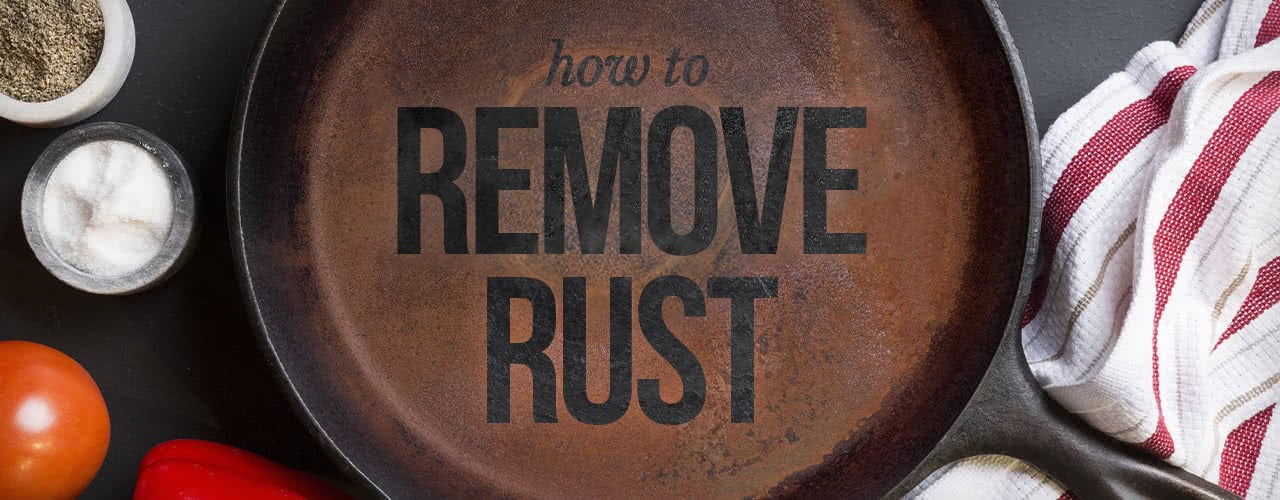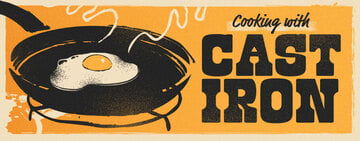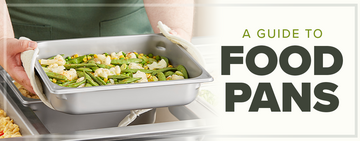
When it comes to rusted cookware, cast iron pans are the biggest offenders. But even some types of stainless steel can become corroded if they aren't cared for properly. Rust can ruin your pans and become a safety issue if you aren't careful. Learn how rust occurs, the best practices to remove rust, and other methods of preventing rust on metal.
Removing Rust
Check out our quick video to learn how to remove rust from your cookware. We demonstrate three methods that will have your cast iron pans looking like new!
How to Get Rid of Rust
If your baking sheets are showing signs of rust, or your favorite sautee pan needs a little TLC, rust removal is an option to refinish the metal. Here’s one method of removing rust from metal and stainless steel.
How to Remove Rust from Metal with Baking Soda
- Take the rusty pan and rinse with water.
- Cover the pan with baking soda.
- Let the baking soda sit for an hour or more on the pan.
- Use a scouring pad to rub the rust off.
- Wash the pan and dry with a towel.
If baking soda and some elbow grease doesn't do the trick to remove existing rust, try this method of using vinegar for heavily rusted pans.
Removing Rust with Vinegar
- Spray or wet pan with water and wipe clean with a cloth.
- Using a 1:1 ratio of water and vinegar, spray the mixture onto the stainless steel.
- Let the vinegar mixture sit for a few minutes to soak into the metal.
- Take a scouring pad and lightly scrub along the grain of the stainless steel to remove the rust. This will prevent other scratches from forming.
- Wash with soap and water and completely dry the pan with a towel.

Do you have a rusty cast iron pan? Follow these steps to remove the rust and resurface your cast iron cookware.
How to Remove Rust from Cast Iron
- Thoroughly scrape the pan with steel wool.
- Wash with soap and water.
- Pat completely dry with a towel, or place the pan on low heat for just a couple minutes until dry.
- Pour a quarter-sized amount of cooking oil into the pan and use a paper towel to coat the inside with the oil.
- Reseason the cast iron pan by placing it in the oven face down at 350 degrees Fahrenheit for one hour. Put a piece of aluminum foil on the rack below to catch excess oil.
- Remove the pan and let it cool.
What Is Rust?
Rust is a brown and orange iron oxide, most commonly found on metal, and can be harmful if consumed. Rust can occur on any metal, even if it contains chromium. Chromium is found in stainless steel and is more reactive to oxygen compared to iron. Chromium oxidizes quickly and actually protects metal from rusting. If the chromium oxide on metal becomes scratched, water settles into the openings of the exposed metal, making it rust.
How Does Rust Occur?
Rust is the chemical reaction that occurs when iron and oxygen meet. When metal is in the presence of water or moisture in the air, rust will form on the metal over time if the water is not removed. If existing rust is not removed, it can continue to build up and get worse over time.
Does Stainless Steel Rust?
If cared for properly, most stainless steel does not rust because it contains the alloy chromium, which will oxidize and create a natural protective coating on the metal. If the stainless steel does not contain enough chromium, there will not be a thick enough layer of oxidation on the metal to protect it from rusting. When buying stainless steel cookware for a commercial kitchen, it is best to purchase 304 stainless steel because of its higher corrosion resistance.
Stainless steel will also rust if not cleaned and polished properly. Cleaning the metal after each use will keep dried and burnt food from building up, and will also help provide a clean surface for polishing. Polishing stainless steel is important for keeping the chromium oxide in tact so rust will not form.

How to Prevent Rust
To prevent rust from forming on metal cookware, do not allow metal to air dry. Dry the metal pan with a microfiber towel right after washing to remove any water from pans or flatware. Prevent rust from forming on cast iron by simply seasoning the pan before the initial use and continually and routinely seasoning it as it is used. You can also buy stainless steel cookware that contains chromium, which will help protect the metal from rusting. Thoroughly cleaning stainless steel pans after use will keep the metal looking great and help it last longer too.
When buying metal cookware, be sure to care for it. This will prevent rust from forming the metal and save a lot of time and effort resurfacing the pans. Keeping your pans in good condition will help them last a lifetime.





